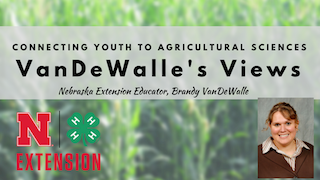Turning manure nutrients into better crop yields while protecting the environment will be the focus of seven Nebraska Extension workshops being held across the state this February and March. Leslie Johnson, UNL animal manure management coordinator has announced that these workshops have traditionally focused on livestock producers because they’re required to attend manure training regularly, but efforts have been made to include crop farmers that are often recipients of the manure because the information shared is just as valuable to them and their bottom line. The workshops will still meet the educational requirements for permitted livestock operations laid out by the Nebraska Department of Environment and Energy’s title 130.
The news release also states that participants who attend the day-long (9 a.m.–4 p.m.) event will receive NDEE land application training certification. The initial land application training certification requires participation in the full-day program, which includes lunch. Attendance at the afternoon session will meet minimum needs for recertification, but participants who only need recertification may choose to attend the full event if they wish for no additional charge. Sessions will include an update on regulations and discussions on how to best use manure on cropland. Anyone is welcome regardless of the need for certification. Crop farmers and livestock operations will learn useful information to apply to their operations.
Sessions will focus on what fields should be chosen to best utilize manure nutrients and other benefits. Each session will be highly participant-led with limited seating. Participants will be given a scenario and asked to determine the priority ranking of each field within the scenario. This ranking will be done at the end of each activity focused on manure nutrients, transportation cost, soil health, water quality, as well as neighbors and odors. Regulations and record-keeping about manure storage and application will also be addressed during each session.
Sessions include:
- Feb. 12 — Columbus
- Feb. 13 — Geneva
- Feb. 19 — Scottsbluff
- Feb. 20 — Lexington
- Feb. 29 — Norfolk
- March 5 — West Point
- March 6 — Ord
Because of participation limits in each session, registration is required. If registration numbers exceed expectations, more sessions may be added. To ensure your attendance, register online. The cost of the sessions will be $75 per operation requiring certification or $25 per person with no expectation of certification.
The workshops are sponsored by the Nebraska Extension Animal Manure Management Team, which is dedicated to helping livestock and crop producers better utilize manure resources for agronomic and environmental benefits. For additional information on the workshops and other resources for managing manure nutrients, visit UNL Water or contact Leslie Johnson at 402-584-3818.








